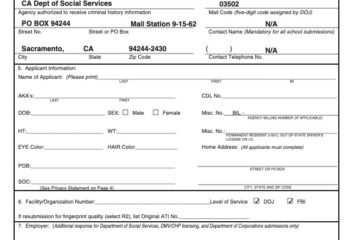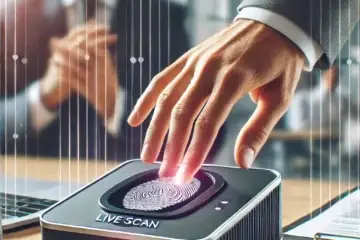Many countries require an FBI background check as part of visa applications, especially for work, residency, and long-term stay visas. This document provides a verified criminal history record or confirms a clean background. Government authorities and employers use this report to assess an individual’s legal history before granting entry or employment. Understanding the process of obtaining and authenticating an FBI background check is essential to avoid delays and ensure compliance with international requirements.
What Is an FBI Background Check?
An FBI background check, officially called an Identity History Summary Check, is a detailed record of a person’s criminal history based on fingerprint data. If an individual has been arrested or charged with a crime in the United States, those records will appear in this report. If no criminal activity is found, the report will indicate a clean history. Many visa and immigration offices request this document to verify whether applicants meet security and legal criteria for entry into their country.
Who Needs an FBI Background Check for a Visa?
Many travelers and professionals applying for visas need an FBI background check, depending on the destination country’s requirements. Those applying for work visas, residency permits, student visas, or long-term travel permits may need to provide this document. Specific professions, such as teachers, healthcare workers, financial service employees, and government contractors, require a criminal background check before employment abroad.
Countries with strict immigration policies use FBI background checks to assess applicants for permanent residency, citizenship, or investment visas. In some cases, even spousal or family-sponsored visas require proof of a clean criminal history.
Step 1: Determining the Need for an FBI Background Check
Before applying for a visa, it is essential to confirm whether an FBI background check is required. This information is available on the official website of the destination country’s embassy or immigration office. Some countries accept local state police checks, while others require a national-level criminal background report issued by the FBI.
If the visa application instructions specify an FBI background check, it is necessary to obtain and authenticate the document before submission. Certain countries also require translations of the report into their official language.
Step 2: Requesting an FBI Background Check
To obtain an FBI background check, an applicant must submit a request through one of two options:
One method is to apply directly through the FBI’s Criminal Justice Information Services (CJIS) Division. This process involves completing the official application form, getting fingerprinted, and submitting the documents via mail or electronically. The processing time for direct FBI applications can take up to four weeks.
A faster option is using an FBI-approved Channeler, a private company authorized to process FBI background checks. Channelers can submit fingerprint data electronically, significantly reducing wait times, with results typically available within 24 to 72 hours. However, some countries only accept FBI reports obtained directly from the FBI rather than through a third-party Channeler.
Step 3: Fingerprinting for the FBI Background Check
Fingerprinting is a crucial requirement for an FBI background check, as the agency uses biometric data to verify identity. Applicants can get fingerprinted at:
- Local police departments that offer fingerprinting services.
- Private fingerprinting agencies that provide professional fingerprinting on FD-258 fingerprint cards.
- Live Scan fingerprinting centers, where fingerprints are captured digitally and submitted electronically.
For mailed submissions, fingerprints must be clear, properly rolled, and printed on an official fingerprint card to prevent rejection.
Step 4: Submitting the FBI Background Check Request
Once the fingerprints and application form are ready, they must be submitted along with the required fee. The FBI accepts credit card payments, money orders, and certified checks. If applying electronically through a channeler, the payment process is integrated into the online submission system.
After processing, the FBI background check results are sent to the applicant. Electronic copies are emailed as secure PDF downloads, while physical copies are mailed via the United States Postal Service (USPS).
Step 5: Authenticating the FBI Background Check for International Use
Many foreign governments require an authenticated FBI background check to ensure it is legally valid in their country. There are two main authentication methods:
If the destination country is part of the Hague Apostille Convention, an apostille is required. An apostille is a certification that verifies the authenticity of a U.S. federal document for international use. Since the FBI is a federal agency, only the U.S. Department of State in Washington, D.C., can issue an apostille for an FBI background check.
For non-Hague countries, the document must go through embassy or consular legalization. This process includes authentication by the U.S. Department of State, followed by legalization at the embassy or consulate of the destination country.
Step 6: Obtaining an Apostille from the U.S. Department of State
To request an apostille, the FBI background check must be submitted to the Office of Authentications at the U.S. Department of State in Washington, D.C. The application must include:
- The original FBI background check document.
- A completed Apostille Request Form (DS-4194).
- The required processing fee.
Standard processing times for apostilles take several weeks, but expedited services through third-party agencies can speed up the process.
Step 7: Embassy or Consular Legalization for Non-Hague Countries
For non-Hague Convention countries, additional authentication steps are required. This involves:
- Getting authentication from the U.S. Department of State.
- Submitting the document to the destination country’s embassy or consulate for legalization.
Embassy legalization requirements vary by country, so checking with the consulate for specific instructions is essential. Some embassies also require certified translations of the background check before final approval.
Common Mistakes to Avoid
One common mistake is applying too late. Since FBI background checks and authentication take time, applicants should start the process several months before their visa application deadline.
Fingerprinting errors also cause delays. If fingerprints are smudged or unclear, the FBI may reject the request, requiring a new submission. Using a professional fingerprinting service can prevent such issues.
Another challenge is submitting documents in the wrong format. Some countries require original hard copies, while others accept digital copies. Ensuring the document meets the foreign government’s requirements avoids rejection.
Final Steps Before Visa Submission
After obtaining the FBI background check and required authentication, applicants must review the visa application checklist provided by the destination country’s immigration office. Some countries require documents to be issued within a specific time frame, often three to six months before submission.
Keeping extra copies of the FBI report and apostille ensures a backup in case the original document is lost or delayed.
Conclusion
An FBI background check is an essential requirement for many visa applications, especially for work, residency, and long-term travel. The process involves fingerprinting, submission to the FBI, and authentication for international use. Depending on the destination country, either apostille certification or embassy legalization is required.
By starting early, ensuring fingerprint accuracy, and verifying authentication requirements, applicants can obtain an FBI background check smoothly and avoid unnecessary delays in their visa process.
Also Read: Step-by-Step Guide to FBI Background Check & Apostille
Frequently Asked Questions
What is an FBI background check for a visa?
An FBI background check for a visa is a summary of your criminal history or confirmation that no criminal record exists. It’s often required for immigration, work, or long-term visa applications in countries like Spain, Italy, Portugal, or South Korea.
How do I request an FBI background check for visa purposes?
You can request an FBI background check through Anshin Notary by submitting your fingerprints via Live Scan or FD-258 ink fingerprint card. We help you securely transmit the request to an FBI-authorized channeler for fast digital processing.
How long does it take to receive my FBI background check?
When submitted electronically through Anshin Notary’s authorized channeler service, FBI background checks are typically delivered by email within 24 hours. If submitted via ink card (FD-258) and mailed directly to the FBI, processing may take several weeks.
What is the difference between Live Scan and ink fingerprinting for FBI background checks?
Live Scan is a digital fingerprinting method that allows for faster electronic transmission to the FBI. Ink fingerprinting (FD-258 card) is a manual process and requires mailing the physical card, which takes longer to process. Anshin Notary offers both services in Los Angeles and Beverly Hills.
Do I need an apostille for my FBI background check?
If your FBI background check will be submitted to a foreign government, you may also need an apostille. Anshin Notary offers apostille services to ensure your documents are internationally recognized and accepted.
Can I get help if I need the report urgently?
Yes. At Anshin Notary, we offer expedited FBI background check services through our channeler partnerships. Contact us to schedule a same-day appointment or to ask about urgent processing options.
What should I bring to my fingerprinting appointment?
Please bring a valid government-issued photo ID (such as a passport or driver’s license) and any paperwork provided by the requesting agency. If mailing a card submission, bring an FD-258 card or ask us to provide one.
Where can I get fingerprinted for an FBI background check in Los Angeles?
You can visit Anshin Notary at our Los Angeles location or schedule a mobile fingerprinting appointment. We provide fast, professional Live Scan and ink fingerprinting services tailored to FBI submissions.



0 Comments